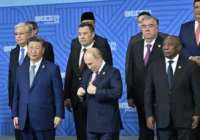Earlier this month, Edward offered his perspective on how the media in the West covered BRICS nations’ position concerning the US dollar. To better understand the intentions, he proposes rethinking the vocabulary we and the media have been using.
“It’s important to note that the narrative ‘BRICS countries target the USD’ seems just a propaganda topic that the so-called mainstream media is pushing. It has very little to do with reality, but as far as propaganda is concerned, it works fine because few people seem to understand what is really going on anyways. The correct narrative is ‘The USD targets the BRICS countries.’ Here’s why:
The part that everybody seems to get wrong: the BRICS+ bankers are not trying to dethrone or attack the dollar. They have been compelled to decouple from the USD because some have already been locked out of USD trade via Western banks and had their assets frozen in Western banks. Others logically anticipate the same treatment at some time in the future. At the same time, they happily trade in USD when they can or need to, and still hold trillions of dollars worth of American treasuries and other paper denominated in USD, although the preference for holding T-bills is changing.
So, as I mentioned earlier, they are undollaring (diversifying away from dollar-only trade), but not dedollaring completely, and they are doing it out of necessity, not some strategic evil scheme they designed out of their own volition. BRICS Bridge is designed to trade in any currency, including the dollar – this fact alone runs counter to the many overarching statements under the ‘BRICS are the enemy of the dollar’ narrative.
The clever propaganda trick is to flip cause and effect, making it appear as though BRICS+ countries are deliberately undermining the dollar, when in fact, they are reacting to being forced out of the USD system. It’s like blaming someone for leaving a burning building when they had no choice but to escape. In this regard, no one has done more than the powers that be in the USA to push the world away from the USD.
One more peculiarity that nobody reports on: allegedly, at least two European banks already using or testing mBridge/BRICS bridge (quietly) are Rothschild & Co and The Institute for the Works of Religion. That got me thinking that this may explain why the Bank of International Settlements (BIS) found themselves between the rock and the hard place:
- BIS bureaucrats think they may have leverage over mBridge
- BIS may not have the authority to do anything about it at all. I would like to hear your thoughts on this.
Nevertheless, it certainly appears that Bloomberg and similar outlets are pushing a narrative that lacks any real analysis or investigation, but instead works to push someone’s divisive geopolitical agenda. The question is why and who is paying for the music?”
It was this question coming from Edward that prompted Alex to pen the response we featured in Money Matters, Part 12, a week ago.
“Who is paying for the music? $1.6 billion ($325 million for 5 years each) appropriated by US Congress to be distributed to journalists to ‘counter the People’s Republic of China Malign Influence’ and the “malign influence of the Chinese Communist Party and the Government of the People’s Republic of China and entities acting on their behalf globally.”
Should anyone be surprised that the US Congress is ready to spend so many of its citizens’ “hard-earned” tax dollars on “correcting” the vocabulary, themes and memes journalists are allowed to use? That sum of $1.6 billion gives us an idea of the cost of managing the news. “Undollar” holds no connotation of aggression, whereas “dedollar” sounds like an assault not just on the dollar, but implicitly on the “rules-based order” associated with it.
If “dedollar” and “undollar” exist, we might wonder whether there should also be a verb “to dollar.” It doesn’t appear so, though such a verb would accurately describe what happened to the global economy in the aftermath of World War II. That was the crucial moment in history when the US economy held all the cards, not just because of its industrial development, but especially because it held the debts of everyone else’s war spending. We sometimes forget that the post World War II world order drew its initial strength and based its stability on the value of a gold-convertible dollar.
Today’s dollar has seen its psychological stature as the universal solvent for international trade seriously diminished. This happened over time, but it now seems to be coming to a head. The dollar ceased being tethered to gold in 1971 when President Richard Nixon waved his hegemonic wand, effectively floating the greenback. But very quickly, by 1975, it had acquired a new platform of stability thanks to Henry Kissinger’s cleverly engineered petrodollar monopoly with Saudi Arabia. But that connection, though not completely broken, has been radically loosened over the past two years.
The dollar’s fundamental strength resides in the perception of the performance of the US economy. But the economy has thrived, above all, on the dollar’s special status. Giscard d’Estaing famously called it the dollar’s “exorbitant privilege.” Gold and then oil became the equivalent of the collateral a bank requires to secure a loan. But the link to both has been compromised. The world has now moved into uncharted waters. The risk of endemic instability for the currency of a nation that is rapidly heading towards an unmanageable accumulated debt of $36 trillion is real. And, like the debt itself, that risk is growing by the day.
This period of political transition following this month’s election offers a new twist. During the campaign, President-elect Donald Trump promised to punish countries that “leave the dollar.” His choice for Secretary of State, Marco Rubio, recently introduced a bill in Congress “to punish countries that de-dollarize.” Asia Times notes that “Rubio’s bill, ominously called the Sanctions Evasion Prevention and Mitigation Act, would require US presidents to sanction financial institutions using China’s CIPS payment system, Russia’s financial messaging service SPFS and other alternatives to the dollar-centric SWIFT system.”
Would such a campaign to sanction and punish be feasible? Does the Trump team seriously believe it can succeed without doing even more damage to the US itself than to the culprits it is seeking to harass? The same article, in its opening paragraph, reminds readers of Edward’s point. “Economic and financial sanctions often backfire. The most notable example is the weaponization of the dollar against Russia.” That, of course, was the event that put dedollarization in the headlines and made it a permanent talking point.
With the arrival of Trump, his cherished taste for trade wars is spawning something else: currency wars. Given that we already have a couple of ongoing hot wars that appear to be escalating, we may soon lack the vocabulary to describe the other wars that may be festering.
On that score, Alex shared with us this week a video document that reveals yet another dimension of the war-infested mindset of today’s political and geopolitical culture. It’s a new kind of war with potentially cataclysmic consequences. Let’s call it the “quantum war.” The British mathematician and writer, Professor Hannah Fry, interviews some of the key players developing quantum computing. They all agree the stakes are very high. Impressed by the potential significance of quantum computing, Alex raised an interesting question:
“Can you imagine if China gets to build a quantum computer before the US does? It would be ‘game over,’ at least for the geo-political games the US likes to play in other countries’ backyards. China could disrupt the DTCC (Depository Trust & Clearing Corporation), the backbone of the US’s financial markets. It processed $3 quadrillion (!) in securities transactions in 2023.”
At one point in the video (19:19), Fry interviews Alexander Ling, a professor at the University of Singapore and head of the Centre for Quantum Technologies. Fry points out that Ling’s group “want to build an unhackable network so that anyone can use it.” She adds this surprising observation: “They also collaborate with US and Chinese companies.”
Ling evokes the period in which quantum technology was first being developed: the 1980s and 1990s. “Everyone was open to having an exchange of people and ideas at that time.” Noting that in her earlier interviews with specialists in the US and the UK, everyone appeared focused on security and the risk of proliferation, Fry calls into question the rhetoric “framed as a quantum race between two giant superpowers who are throwing everything they have at it.” She then asks the real question: “Will a high stakes duel for supremacy really define the future of global power?”
Whether considering reserve currencies or scientific research, for some people, every issue boils down to a duel for supremacy.
Join the debate
Money Matters…, is dedicated to developing this discussion and involving all interested parties.
We invite all of you who have something to contribute to send us your reflections at dialogue@fairobserver.com. We will integrate your insights into the ongoing debate. We will publish them as articles or as part of the ongoing dialogue.
*[Fair Observer’s “Crucible of Collaboration” is meant to be a space in which multiple voices can be heard, comparing and contrasting their opinions and insights in the interest of deepening and broadening our understanding of complex topics.]
[Lee Thompson-Kolar edited this piece.]
The views expressed in this article are the author’s own and do not necessarily reflect Fair Observer’s editorial policy.
Support Fair Observer
We rely on your support for our independence, diversity and quality.
For more than 10 years, Fair Observer has been free, fair and independent. No billionaire owns us, no advertisers control us. We are a reader-supported nonprofit. Unlike many other publications, we keep our content free for readers regardless of where they live or whether they can afford to pay. We have no paywalls and no ads.
In the post-truth era of fake news, echo chambers and filter bubbles, we publish a plurality of perspectives from around the world. Anyone can publish with us, but everyone goes through a rigorous editorial process. So, you get fact-checked, well-reasoned content instead of noise.
We publish 2,500+ voices from 90+ countries. We also conduct education and training programs
on subjects ranging from digital media and journalism to writing and critical thinking. This
doesn’t come cheap. Servers, editors, trainers and web developers cost
money.
Please consider supporting us on a regular basis as a recurring donor or a
sustaining member.
Will you support FO’s journalism?
We rely on your support for our independence, diversity and quality.










Comment